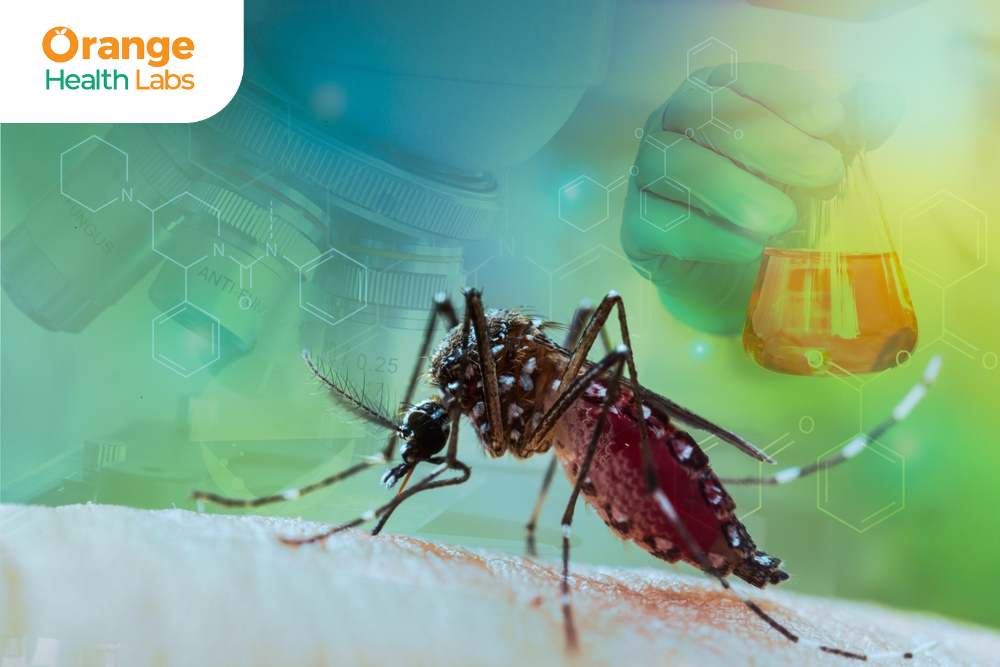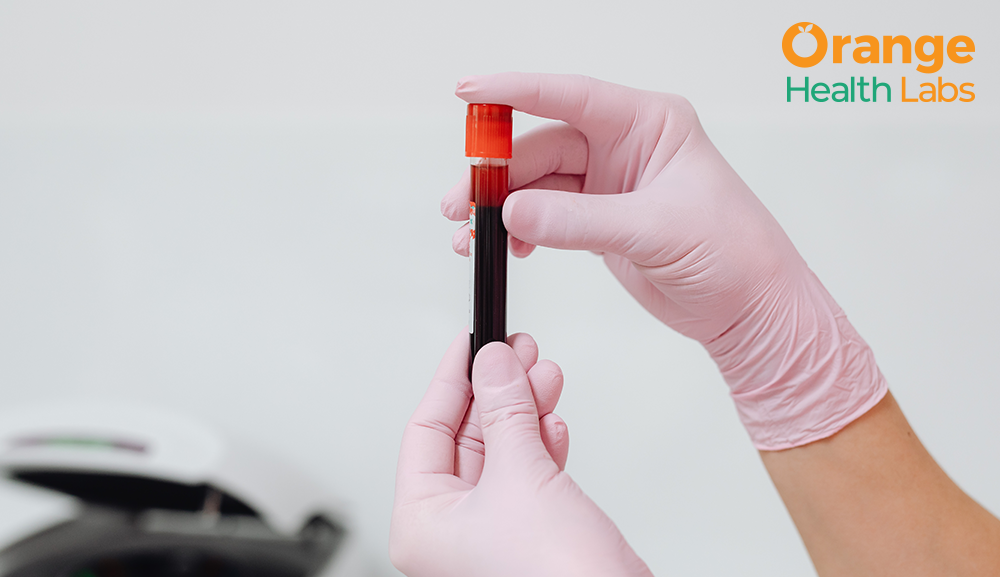Search for tests or checkups
SupportFrom Symptom Recognition to Diagnosis: The Dengue Testing Process Demystified

Dengue fever is a viral disease that has become a significant worldwide health concern, affecting millions yearly. This sickness spread by mosquitoes can vary from just a fever to severe dengue, which is serious. Around 2.5 billion people live in regions with dengue risk, and every year, about 100 million new cases of dengue fever are seen globally. According to data based on a global model, it's believed that about 33 million people in India have observable symptoms of dengue fever every year. This makes up about a third of all dengue cases worldwide. Because dengue is becoming more common, it's really important to catch it early so it can be treated well. In this blog, we'll explain how dengue testing works, from spotting the first signs to figuring out the different tests and what they do.
Recognizing the Symptoms of Dengue
Dengue fever, often called breakbone fever because of the intense muscle and joint pain it causes, is a viral illness spread by mosquitoes. It's also known as dandy fever or seven-day fever because symptoms typically last about a week. Even though many people don't show any symptoms, it can become severe and even deadly in some cases. When you have dengue fever, it might start with symptoms that seem like a normal sickness. However, it's important to know these early signs so you can see a doctor quickly. The first signs of dengue include:
- Muscle and joint aches
- High fever
- Feeling nauseous or sick to your stomach
- Intense headaches
- Skin rash
- Pain in the eyes
- Vomiting
These symptoms usually show up about 10 days after a mosquito bite infects you and usually stick around for about 3 to 7 days. As dengue gets worse, it might develop into something called severe dengue and show the following symptoms:
- Blood in vomit or stool
- Stomach or abdominal pain
- Severe fatigue, restlessness, or irritability
- Frequent vomiting
- Nosebleeds or bleeding gums
Severe dengue is a serious medical emergency that could lead to death. If you have dengue or reside in an area prone to dengue, head to the nearest emergency room to get a dengue test without delay if you encounter any of the above symptoms.
The Role of Primary Care in Dengue Suspicion
If you think you have dengue fever, you naturally see your primary care doctor first. They'll ask about your symptoms and travel history to see if dengue is likely. At your first visit, they'll ask when your symptoms started and if you've been to places with dengue or where mosquitoes breed. They'll also check you physically for other possible causes of your symptoms. If you show persistent symptoms indicating severe dengue, you might be referred to specialised care for closer monitoring and treatment.
Dengue fever can progress through different stages, and understanding these phases is crucial for primary care doctors to manage the disease effectively and reduce the risk of complications or severe outcomes. Make sure you recognise your initial symptoms and seek help immediately. By being watchful at different stages of the disease, you can get appropriate and timely treatment, ultimately lowering the risk of severe illness or even death.
Laboratory Tests Used in Dengue Diagnosis
Although getting physically checked by a doctor is the first step, dengue test done at a laboratory are really important for confirming the diagnosis. Different tests are available for the diagnosis of dengue, each with its own characteristics as follows
NS1 Antigen Test:
This blood test detects the presence of a specific dengue virus protein called non-structural protein 1 (NS1) in the bloodstream. It is particularly useful in the early stages of the infection, typically within the first 5 to 7 days of symptom onset. If the NS1 test comes back positive, it means you likely have dengue, but it doesn't tell us which specific type of dengue you have. Knowing the exact type isn't crucial for treatment, but it's needed for keeping track of the virus.
IgM and IgG Serological Tests:
These dengue tests detect the antibodies made by the body to fight the virus. The IgM test is usually positive 5 days after symptoms start, showing a current infection. The IgG test indicates a past or recent infection. After exposure, IgM levels peak in 710 days, then decrease. IgG levels rise more slowly, stay steady, and last long-term. If you have had dengue earlier, IgG antibodies can affect test results.
PCR Test:
The polymerase chain reaction (PCR) test is a highly sensitive molecular diagnostic tool that can directly detect the dengue virus genetic material in the bloodstream. This test is most effective during the early stages of infection, typically within the first 5 days of the onset of symptoms.
Your healthcare provider will determine the most appropriate test(s) based on the timing and duration of your symptoms, as well as any potential risk factors or exposure history.
Understanding Dengue Test Results
Interpreting dengue test results can be complex, as the accuracy and reliability of the tests can be influenced by factors such as the timing of the test and the stage of infection. Here's what different test results may indicate:
- If the NS1 test is positive, it means you have dengue, but it doesn't say which type. A negative result doesn't mean you don't have dengue. If the NS1 test is negative, you should get tested for dengue IgM antibodies to check for recent dengue exposure.
- If both IgM and IgG tests for dengue antibodies are positive in an initial blood sample, it likely means the person was infected with the dengue virus in recent weeks. If IgG is positive while IgM is negative or low, it indicates that the person may have had a dengue infection in the past.
- A positive PCR result confirms the presence of dengue virus genetic material in the bloodstream, indicating an active infection.
It's important to note that false-negative or false-positive results can occur, especially if the tests are performed outside of the optimal time frame of symptom onset or if the patient has been previously exposed to other flaviviruses, such as Zika or chikungunya. Therefore, it is essential to consider the timing of the tests for accuracy and reliability. Testing too early or too late in the course of the illness can affect the interpretation of results.
Challenges in Dengue Testing
While the available diagnostic tests have significantly improved our ability to detect a dengue infection, there are still challenges and limitations to overcome when it comes to dengue tests:
- Potential for False-negatives or False-positives: As mentioned earlier, the timing of the test and previous exposure to other flaviviruses can lead to inaccurate results, requiring careful interpretation and, in some cases, repeated testing.
- Cross-reactivity With Other Flaviviruses: Some dengue tests, particularly the serological tests, may cross-react with antibodies produced in response to other flaviviruses, making it difficult to differentiate between different viral infections.
- Limited Access to Testing Resources: In some places where resources are scarce, it can be hard to get reliable and affordable dengue tests. This makes it tough to diagnose dengue quickly and treat it properly.
- Ongoing Research and Development: Even though we've come a long way in dengue testing, we still need more research and development to make more accessible, affordable, sensitive and accurate dengue tests.
Preventive Measures and Managing Dengue Risk
Although it's important to diagnose and treat dengue fever quickly, preventing it is the best approach. Here are some important ways to prevent dengue:
- Mosquito Control: Since dengue is a vector-borne disease spread by mosquitos, preventing dengue infections mostly relies on controlling mosquitoes, which are the main carriers of the virus. Environmental actions to manage these mosquitoes are seen as the best way to do this, as they're safe and don't harm the environment much. Get rid of any standing water around your home, like in flower pots or old tyres, where mosquitoes lay their eggs. You can also use insecticides to kill mosquitoes. By restricting their breeding grounds, you can prevent dengue easily.
- Protect Yourself: Use bug repellents, wear long-sleeved shirts and pants, and use mosquito nets over your bed. Make sure the windows and doors of your home have screens to keep mosquitoes out.
- Educate Yourself: Know the symptoms of dengue, like high fever, severe headache, and body pain. Teach your family and friends to recognise the symptoms of dengue and how to prevent it.
- Stay Alert: Pay attention to any warnings or alerts about dengue outbreaks in your area. This way, you can take extra precautions to protect yourself and your loved ones.
By following these few easy steps for dengue prevention, you can protect yourself and your community from dengue fever and its associated complications.
Conclusion
In conclusion, dengue fever is a serious health concern, but recognising symptoms early and getting the right tests promptly is key to managing it well. Understanding how dengue tests work, from spotting symptoms to understanding test results, can help you get the care you need quickly. If you think you might have dengue fever, don't wait. See a doctor right away. Getting help early and managing the illness appropriately can make a significant difference in your recovery and prevent serious complications down the line.
Book Dengue Test in your city: Dengue Test in Mumbai | Dengue Test in Bangalore | Dengue Test in Noida | Dengue Test in Hyderabad | Dengue Test in Gurgaon | Dengue Test in Faridabad | Dengue Test in Delhi

Is stress making you fat?

Understanding 8 Common STDs: What You Need to Know
